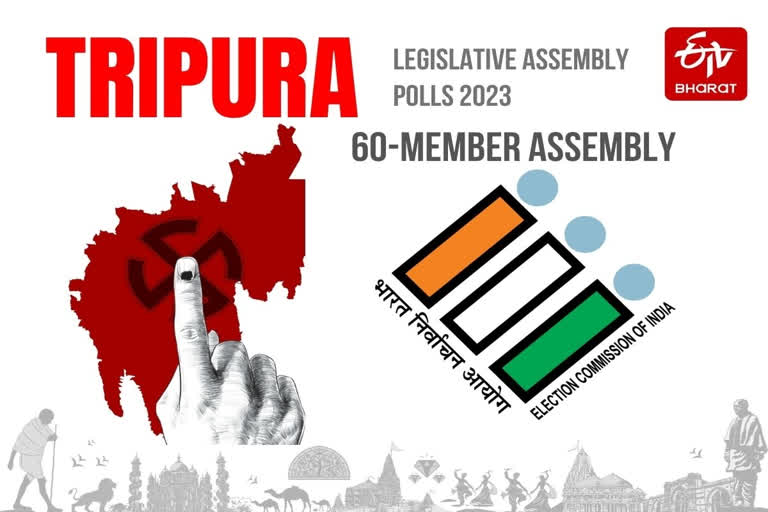Hyderabad: The political turf in the country's northeast is heating up with Tripura all set to vote in assembly elections on Thursday, February 16 followed by elections in Meghalaya and Nagaland on February 27. The counting of votes will take place on March 2. Each state assembly comprises 60 members and their terms are set to expire in March.
As for Tripura, the Northeastern state will witness Bharatiya Janata Party (BJP), Trinamool Congress (TMC), Communist Party of India Marxist (CPIM) compete for power. BJP would want to at least repeat their 2018 numbers in Tripura and retain power given the fact that the results will be precursor to their 2024 plans.
However, Tripura Chief Minister Manik Saha is highly optimistic of a massive win and grandly improving its previous result in the Northeastern state. On Monday, Saha said he was predicting a 'tsunami' and that the saffron party would retain power with a much higher tally than 2018. "You've heard of a tsunami... something like that will happen. Anything can happen... but it will not be less than 2018. In 2018 we got 36 seats and our alliance partner got eight seats. So, this time we will get more..." he told ANI.
Security arrangements, timing, number of voters
Tripura Assembly polls are set to begin at 7 am on Thursday morning and end at 4pm. A total of 2.8 million eligible voters will participate in the election, and 259 candidates are contesting, of whom 20 are women. The Election Commission has completed all arrangements for the elections. Officials said that polling staff entrusted with the necessary material have been sent to the 3,328 polling booths set up in the state. The polling staff assembled at Umakanta School in capital Agartala from where the EVMS were distributed among them.
Paramilitary armed forces have also been deployed to ensure fair and peaceful polling exercise in the state. While there is heavy deployment of CRPF within the state, the Border Security Force has heightened vigil on the Indo-Bangladesh border. The counting of votes will take place on March 2, along with Meghalaya and Nagaland, according to the official notification from the Election Commission of India (ECI), and the results will be announced on March 3.
Key leaders and the public mood
This assembly election holds high stakes as the political fate of several prominent leaders, including Chief Minister Manik Saha, Deputy Chief Minister Jishnu Debbarman, Union Minister of State for social justice and empowerment Pratima Bhowmik, CPI(M) leader Jitendra Choudhury, Congress leader Sudip Roy Burman, and others, will be decided.
It is interesting to note that Tripura is a key battle for the BJP given that Prime Minister Narendra Modi had, in his December 2022 visit to the state, asked the party cadres to replicate the Gujarat model in the state. In the 2018 elections, of all the northeastern states, BJP managed to reach a simple majority in Tripura only.
Winning 36 seats, the saffron party was able to overthrow the two-decades old Left government. While anti-incumbency and distress among the voters worked against the CPI(M)-led government, Prime Minister Narendra Modi too played a key role as his popularity managed to get BJP across. Five years later, the ruling BJP is facing multiple challenges including anti-incumbency, the emergence of Opposition alliances, and the rise of a new tribal force.
In response to criticism from Opposition parties regarding broken promises and increasing political violence, the BJP changed its chief minister just 10 months before the assembly polls, hoping to gain an advantage as it did in Gujarat. PM Modi has also reminded Tripura that a "double engine" government of BJP at the Centre and in the state is needed for the state's development.
The BJP must also counter the impact of the alliance between traditional rivals CPI(M) and Congress. In the 2018 elections, CPI(M) won 16 seats and Congress won none, but the Congress improved its vote share to 25% in the 2019 Lok Sabha polls. The new alliance has potential to sway Congress voters who backed BJP to end CPI(M) rule, but it is uncertain whether anti-BJP votes will consolidate, especially with the entrance of the Trinamool Congress. TMC is expected to target the same votes as the Left and the Congress, while the BJP hopes that the split in non-BJP votes will work in its favor.
The emergence of Tipra Motha, led by Pradyot Manikya Debbarma, is the biggest worry for the BJP as it has positioned itself as the champion of the indigenous tribal people. Last year, Tipra Motha-led alliance swept the Tripura Tribal Areas Autonomous District Council (TTAADC) polls, winning 18 of the 28 seats. The BJP tried to form an alliance with Tipra Motha, but the talks fell through as Debbarma was clear that his party would not join hands with anyone without a written assurance about creating a separate state. The rise of Tipra Motha, along with the death of IPFT founder N.C. Debbarma and the defection of several leaders, including three MLAs, have severely dented IPFT's influence.
With so many undercurrents, Tripura is facing a multi-cornered contest for the first time in recent history. The state has traditionally voted decisively, giving a single party majority, but there is now a possibility of a hung assembly. In such a scenario, the BJP has the best chance to form the government, thanks to its recent manoeuvring in several states where it did not have a majority.



